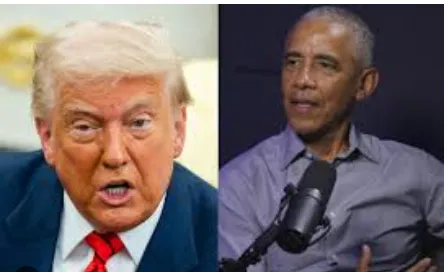

Washington DC, February 15: Former President Barack Obama has harshly criticized American politics under former President Donald Trump's second administration, labeling it a "clown show" during a recent interview. Obama expressed concern that much of the rhetoric emerging from the White House has unsettled a significant portion of the American public.
Speaking on Brian Tyler Cohen's "No Lie" podcast, published Saturday, Obama addressed a controversial video shared earlier this month on Trump's Truth Social platform. The clip, which briefly depicted Obama and former First Lady Michelle Obama as apes, drew widespread condemnation from both political parties. Trump, however, refused to apologize for the post, despite the backlash. The White House later attributed the offensive content to a staffer's "error" and quickly removed it.
Obama emphasized that the majority of Americans find such behavior "deeply troubling," adding that it reflects a disturbing shift in political discourse. Cohen raised concerns about the "de-evolution of discourse," pointing to the video as well as the administration's labeling of two US citizens killed during an immigration enforcement operation in Minneapolis as "domestic terrorists." Obama suggested that these inflammatory remarks were intended as distractions, but reiterated that most Americans continue to value decency, respect, and kindness.
The former president further criticized the current political climate, particularly the behavior on social media and television. "There's this sort of clown show that's happening," Obama remarked. "What’s true is that there’s no longer any shame among those who once understood the importance of decorum and respect for the office."
Obama also addressed the actions of the Republican Party, pointing out that the GOP has failed to "codify or institutionalize anything" beyond the so-called One Big, Beautiful Bill since gaining control of Congress. He noted that Republicans had poured significant resources into Immigration and Customs Enforcement (ICE) and focused on tax cuts for the wealthy, but had not made any lasting legislative progress.
"In many ways, their job has been easier," Obama said, suggesting that Democrats face a more challenging road ahead in striving to enact meaningful change. He acknowledged the responsibility of working to restore norms and decency, stressing the importance of pushing for a more respectful and civil political environment. ( Agency Input)